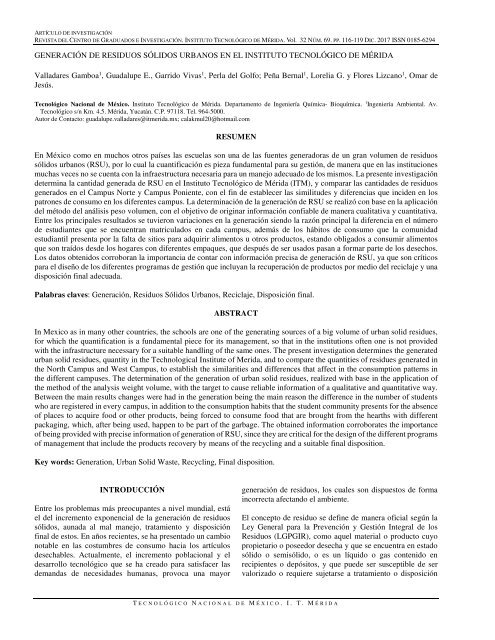V 32 N 69 FA
Create successful ePaper yourself
Turn your PDF publications into a flip-book with our unique Google optimized e-Paper software.
ARTÍCULO DE INVESTIGACIÓN<br />
REVISTA DEL CENTRO DE GRADUADOS E INVESTIGACIÓN. INSTITUTO TECNOLÓGICO DE MÉRIDA. Vol. <strong>32</strong> NÚM. <strong>69</strong>. PP. 116-119 DIC. 2017 ISSN 0185-6294<br />
GENERACIÓN DE RESIDUOS SÓLIDOS URBANOS EN EL INSTITUTO TECNOLÓGICO DE MÉRIDA<br />
Valladares Gamboa 1 , Guadalupe E., Garrido Vivas 1 , Perla del Golfo; Peña Bernal 1 , Lorelia G. y Flores Lizcano 1 , Omar de<br />
Jesús.<br />
Tecnológico Nacional de México. Instituto Tecnológico de Mérida. Departamento de Ingeniería Química- Bioquímica. 1 Ingeniería Ambiental. Av.<br />
Tecnológico s/n Km. 4.5. Mérida, Yucatán. C.P. 97118. Tel. 964-5000.<br />
Autor de Contacto: guadalupe.valladares@itmerida.mx; calakmul20@hotmail.com<br />
RESUMEN<br />
En México como en muchos otros países las escuelas son una de las fuentes generadoras de un gran volumen de residuos<br />
sólidos urbanos (RSU), por lo cual la cuantificación es pieza fundamental para su gestión, de manera que en las instituciones<br />
muchas veces no se cuenta con la infraestructura necesaria para un manejo adecuado de los mismos. La presente investigación<br />
determina la cantidad generada de RSU en el Instituto Tecnológico de Mérida (ITM), y comparar las cantidades de residuos<br />
generados en el Campus Norte y Campus Poniente, con el fin de establecer las similitudes y diferencias que inciden en los<br />
patrones de consumo en los diferentes campus. La determinación de la generación de RSU se realizó con base en la aplicación<br />
del método del análisis peso volumen, con el objetivo de originar información confiable de manera cualitativa y cuantitativa.<br />
Entre los principales resultados se tuvieron variaciones en la generación siendo la razón principal la diferencia en el número<br />
de estudiantes que se encuentran matriculados en cada campus, además de los hábitos de consumo que la comunidad<br />
estudiantil presenta por la falta de sitios para adquirir alimentos u otros productos, estando obligados a consumir alimentos<br />
que son traídos desde los hogares con diferentes empaques, que después de ser usados pasan a formar parte de los desechos.<br />
Los datos obtenidos corroboran la importancia de contar con información precisa de generación de RSU, ya que son críticos<br />
para el diseño de los diferentes programas de gestión que incluyan la recuperación de productos por medio del reciclaje y una<br />
disposición final adecuada.<br />
Palabras claves: Generación, Residuos Sólidos Urbanos, Reciclaje, Disposición final.<br />
ABSTRACT<br />
In Mexico as in many other countries, the schools are one of the generating sources of a big volume of urban solid residues,<br />
for which the quantification is a fundamental piece for its management, so that in the institutions often one is not provided<br />
with the infrastructure necessary for a suitable handling of the same ones. The present investigation determines the generated<br />
urban solid residues, quantity in the Technological Institute of Merida, and to compare the quantities of residues generated in<br />
the North Campus and West Campus, to establish the similarities and differences that affect in the consumption patterns in<br />
the different campuses. The determination of the generation of urban solid residues, realized with base in the application of<br />
the method of the analysis weight volume, with the target to cause reliable information of a qualitative and quantitative way.<br />
Between the main results changes were had in the generation being the main reason the difference in the number of students<br />
who are registered in every campus, in addition to the consumption habits that the student community presents for the absence<br />
of places to acquire food or other products, being forced to consume food that are brought from the hearths with different<br />
packaging, which, after being used, happen to be part of the garbage. The obtained information corroborates the importance<br />
of being provided with precise information of generation of RSU, since they are critical for the design of the different programs<br />
of management that include the products recovery by means of the recycling and a suitable final disposition.<br />
Key words: Generation, Urban Solid Waste, Recycling, Final disposition.<br />
INTRODUCCIÓN<br />
Entre los problemas más preocupantes a nivel mundial, está<br />
el del incremento exponencial de la generación de residuos<br />
sólidos, aunada al mal manejo, tratamiento y disposición<br />
final de estos. En años recientes, se ha presentado un cambio<br />
notable en las costumbres de consumo hacia los artículos<br />
desechables. Actualmente, el incremento poblacional y el<br />
desarrollo tecnológico que se ha creado para satisfacer las<br />
demandas de necesidades humanas, provoca una mayor<br />
generación de residuos, los cuales son dispuestos de forma<br />
incorrecta afectando el ambiente.<br />
El concepto de residuo se define de manera oficial según la<br />
Ley General para la Prevención y Gestión Integral de los<br />
Residuos (LGPGIR), como aquel material o producto cuyo<br />
propietario o poseedor desecha y que se encuentra en estado<br />
sólido o semisólido, o es un líquido o gas contenido en<br />
recipientes o depósitos, y que puede ser susceptible de ser<br />
valorizado o requiere sujetarse a tratamiento o disposición<br />
T E C N O L Ó G I C O N A C I O N A L D E M É X I C O . I . T . M É R I D A


















